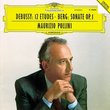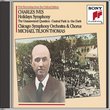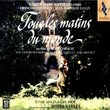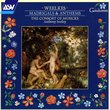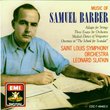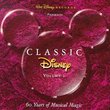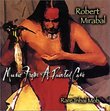| All Artists: Thomas Hampson, Gustav Mahler, Leonard Bernstein, Vienna Philharmonic Orchestra Title: Mahler: Lieder eines fahrenden Gesellen; Kindertotenlieder; Rückert-Lieder Members Wishing: 0 Total Copies: 0 Label: Deutsche Grammophon Release Date: 9/12/1991 Genres: Pop, Classical Style: Vocal Pop Number of Discs: 1 SwapaCD Credits: 1 UPC: 028943168229 |
Search - Thomas Hampson, Gustav Mahler, Leonard Bernstein :: Mahler: Lieder eines fahrenden Gesellen; Kindertotenlieder; Rückert-Lieder
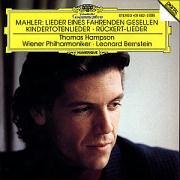 | Thomas Hampson, Gustav Mahler, Leonard Bernstein Mahler: Lieder eines fahrenden Gesellen; Kindertotenlieder; Rückert-Lieder Genres: Pop, Classical
|
Larger Image |
CD DetailsSimilar CDs
Similarly Requested CDs |
CD ReviewsHeartfelt, almost prayerful Gregory J. Diercks | Chicago, IL USA | 05/26/1999 (5 out of 5 stars) "I have, probably, 30 different recordings of the kindertotenlieder. I have probably heard 30 live performances of the work - everything from college recitals to professionals. When I found this Hampson/Bernstein disc, I was thrilled - arguably the two best Mahler interpreters working together! When I first listed to the Kindertotenlieder, I found myself sobbing in my living room. The angst and anger of the parent who lost their children come through so strongly. Then, in the last song, the resolution comes through so solemnly and prayerfully.This is a must have disc for any Mahler fan and any classical vocal fan." So wonderful that hurts. Francisco Yanez Calvino | Santiago de Compostela, GALIZA, Spain. | 02/01/2006 (5 out of 5 stars) "We can say this is the best cycle of Mahler's songs on CD. Of course there are marvellous performances available on the stores (Dieskau-Furtwängler, Baker-Barbirolli, Dieskau-Kubelik...), performances you will need if you want to discover some of the possibilities this songs offer, but if I'm asked for the most completely couple of the lieder I would say this is the one, the recordings in which everything is quite perfect, the singer, the orchestra, the conductor and the recording. Apart from being everything perfect, the recordings transmit the deep emotions the performances gave even to the artists we listen here; we have to remember Hampson's words about the end of Kindertotenlieder, after which both singer and conductor were crying of emotion, something I hope we can watch in a future DVD if these concerts are released. Thomas Hampson is, in my opinion, the best mahlerian singer in our days, with a property personality, not trying to go into Fischer-Dieskau steps, something very important, because that use to be the `fault' of many singers, to try to `copy' the maestro. His understanding of every lieder is very deep and I really prefer man's voice for these songs than the very usual female one, for many reasons, one of them because of the songs' texts, which are really told by a man. Of course that feelings could be felt by every human being, man or woman, but I found the sense much more apropiate to be sung by a bariton... in my opinion, of course. The orchestral playing is simply terrific and electrifying, perfect from quite all the points of view. Bernstein's baton understand Mahler's universe like no one and he represents the last years of a period in Mahler performing, the last maestros of the second half of XXth Century. This CD is, in my opinion one of his best in Mahler, and that's really too much. The dynamics, the tempi, the technical playing is perfect and the recording is so good we can listen everything. The piece called `In diesem Wetter in diesem Braus' is a clear example of how amazing this CD can be. I have never listen this like in this CD. The last piece is marvellous too, the contrasts are perfectely done always. The sound is magnificent and the booklet great, with a beautiful photo of the concert. I hope it will be released on DVD soon, because it's one of the best Mahler's recording I know... and I know hundreds... I hope we can finish the watching of that DVD on tears, like the players... this music sometimes hurts, it have to be so... STRONGLY RECOMMENDED. " The Heart and Angst of Mahler Grady Harp | Los Angeles, CA United States | 03/15/2006 (5 out of 5 stars) "For everyone who has been exposed to the wonder of the song cycles of Gustav Mahler this CD is one that is a must for collecting. Recorded in 1991 when Leonard Bernstein and Thomas Hampson were in their heyday as the leading interpreters of Mahler's music, this CD remains the gold standard despite the fat that there are many superb performances now available. Bernstein and Hampson simply were on the same wavelength and that long collaborative history is what makes this particular recording so special.
Hampson's voice here is clear, and nuanced and relatively free of some of the mannerisms that can at times disrupt his performances both live and on recording. Here he sings the 'Lieder eines fahrenden Gesellen', the 'Kindertotenlieder', and the 'Rückert-Lieder' with all the haunting sadness and despair with which Mahler imbued these works. His enunciation is perfect (Germany is his second home) and his sense of drama and of legato line is seamless. Bernstein conducts the Vienna Philharmonic with his usual caressing legato and rhythmic freedom we have come to accept as the Bernstein Mahler mode. Here it works beautifully and the Orchestra has rarely sounded so lush and responsive. Mahler/Bernstein/Hampson are a triad that history will always revere and nowhere is that more evidenced than in this splendid recording. Highly Recommended. Grady Harp, March 06" |

 Track Listings (14) - Disc #1
Track Listings (14) - Disc #1
![Canadian Portraits: Murray Adaskin [Canada]](https://nationalbookswap.com/cd//m/40/0540/1030540.jpg)


